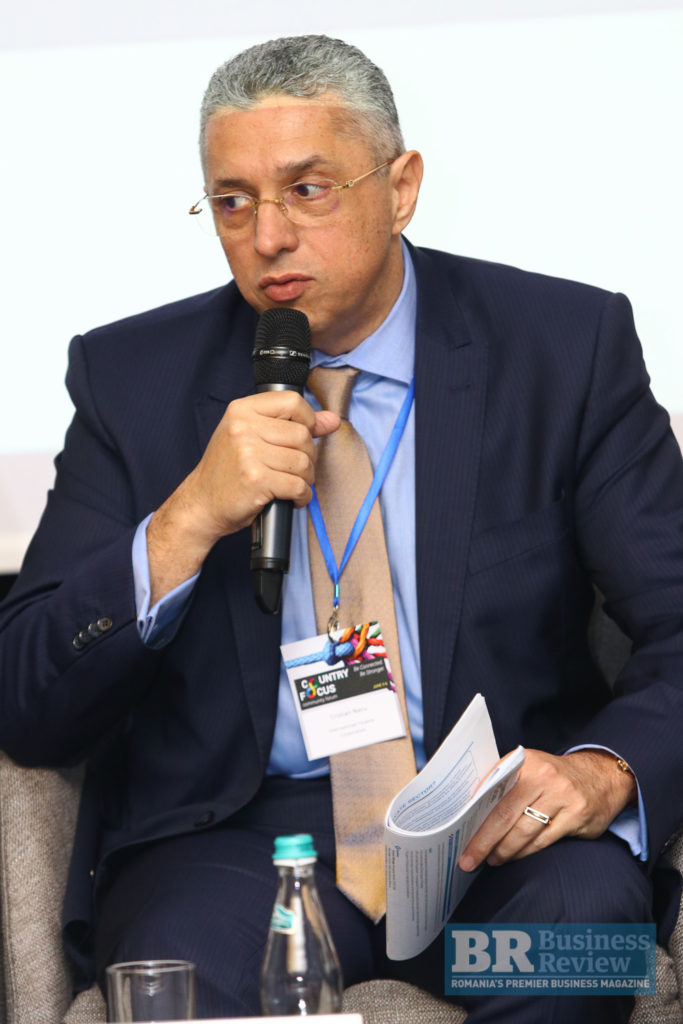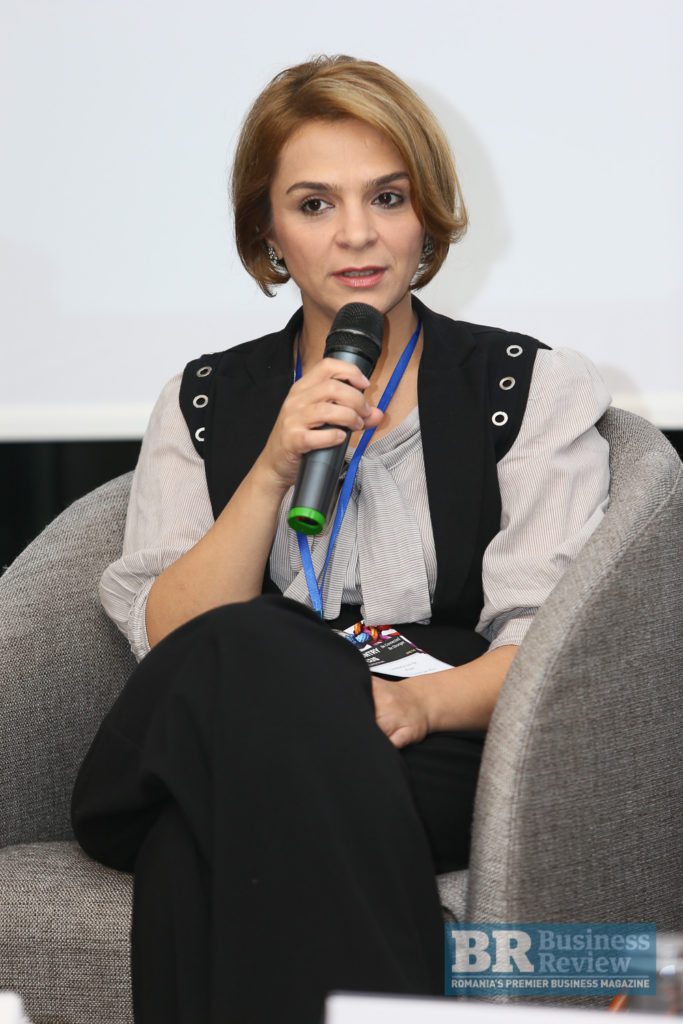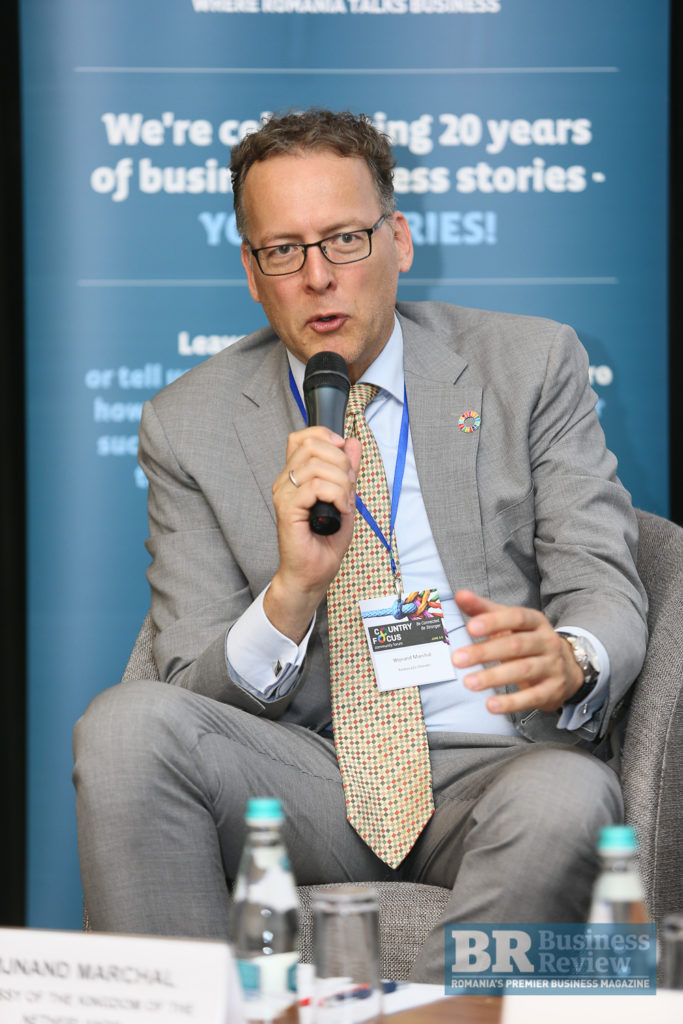The second edition of the Country Focus Community Forum will bring together Romania’s main foreign investment communities and policymakers in a bid to map the country’s future strategic economic development.
With the centennial marking this year, Romania has the opportunity to start a conversation about its role in the region and its future development strategy as an EU member state. Romania is also scheduled to get the EU Council rotating presidency in the first half of 2019, compelling policymakers to navigate a complex international environment marked by UK’s planned EU departure.
Here are the main statements from Day 1:
The first panel includes: Finance Minister Eugen Teodorovici, Minister of Business, Commerce and Entrepreneurship, Stefan Radu Oprea, Ionut Dumitru (Raiffeisen Bank), Cristian Nacu (International Finance Corporation) and Horia Braun (BCR).
Ionut Dumitru (Raiffeisen) – short introduction in the macroeconomic context:
- sustained upward trend of economic activity – the main factor of economic growth was consumption, leading to an economic growth of almost 7 percent last year, 90 percent based on consumption – but the econmic growth was very fragile and definitely not sustainable.
- the most dynamic sector was services, due to the uptake in trade as a result of higher consumption
- fiscal revenues at a historical minimum of the last 20 years
- social spending is the highest in Europe as a percentage of fiscal revenues
 public investments – 2.8 of GDP in 2017, among lowest in Europe
public investments – 2.8 of GDP in 2017, among lowest in Europe- constructions have had a mixed evolution, the sector is very affected by the decrease in public infrastructure works; the private construction sector is doing better
- the level of investments has been disappointing in the past few years; last year they recovered a little in the private sector, but not in the public sector
- consumption is growing due to an aggressive decrease in VAT, and due to the fact that salaries in the public sector have skyrocketed – the number of employees has grown quickly in both the private and public sectors – unemployment is at historical lows, but lots of companies are complaining about the lack of qualified workers.
- macroeconomic indicators – industrial output decreased in Q1
- in Q1 2018, due to the so-called fiscal revolution the consumer confidence crashed, which led to a 0 percent growth q/q, showing that the recent economic growth has been fragile and not sustainable.
- low absorption of EU funds in the last years
- the highest inflation in Europe
Stefan Radu Oprea – Minister of Business, Commerce and Entrepreneurship
- 70 percent of doctors have stayed in Romania following an increase of their salaries – we need quality services especially in health and education, but not exclusively
- the ministry supports entrepreneurship by helping companies in their first years, helping people take their fate into their own hands
- very important – what happens to these start-ups after they are opened

- internationalisation – a programme that allows companies to participate in exhibitions and fairs to take their products abroad
- digital skills – only 27 percent of Romanian SMEs currently have a website, which is very worrying in the context of Industry 4.0
- we want to change mentalities, perceptions – we want to visit Romania’s counties and bring together entrepreneurs and fiscal agencies, in order to improve the relationship between the state and entrepreneurs and bring forward the idea of the state as a business partner
- unfortunately Brexit is happening although we hoped it wouldn’t
- a trade agreement with Japan is going to be put in place soon – I visited several dozens of companies in Japan recently, and saw that they were eager to come to Romania and invest in our country
- going out of our comfort zone in terms of international trade – we do a lot of trade with Germany but we also need to have a wider stance and understand that the Romanian business environment is ready to go out to other international market
Eugen Teodorovici, Public Finance Minister:
- we shouldn’t say that 2016 was the year when the most EU funds entered Romania – there is a difference between when the projects are submitted and when the payments are made
- I would like those who are knowledgeable to come up with proposals, solutions for things like the current account deficit, and we can come together and discuss all our ideas
- eliminating visas for doing business in countries like the US – this is a barrier to fair and free competition with our European neighbours who don’t need visas for those countries and can easily do business there
- Not being in Schengen yet despite meeting all the criteria also inhibits Romania’s growth
- there are 16 countries in Europe with public debts of over 60 percent of GDP – yet everyone criticises Romania for a 35 percent public debt, a very large economic growth – doesn’t matter if it’s based on consumption or something else
- many are making noise politically, which scares off investors and affects the market – we shouldn’t listen to such nonsense
- irresponsible political statements increase the state’s loan costs
 there are differences between states and how their economies react to various international events such as an increase in the oil prices
there are differences between states and how their economies react to various international events such as an increase in the oil prices- a department will be created at the Competition Council each EU member state’s treatment of Romanian business – twice a year it will create a report for each EU state and each economic sector
- at the Finance Ministry, we are working on improving the business environment in terms of legislation
- we understand the private sector very well, but we want the business environment to help us make the necessary changes and simplify the Fiscal Code
- on tax evasion: companies have been closed for no good reason; employees of the justice system were sent to ANAF to indict companies for tax evasion before they ever had the chance to correct their mistakes
- the new Emergency Order for Public Acquisitions will come into force immediately, and will apply to all ongoing public acquisition contracts
- a new structure at the Finance Ministry to make public acquisition contracts for several sectors in the economy, including hospitals, which will make it easier for institutions to manage their investments
- I will immediately cut any unnecessary public spending at the upcoming budgetary revision
- Romania’s borders will be reinforced and we will stop any illegal transports of goods much more efficiently than before
- everything that comes into the country will be scanned; we’ll buy the best scanners we can find
- we need to treat companies based on their fiscal behaviour – if their relation with the state and their business partners is fair, they will get all the facilities they need from the state
- banks will be able to get access to acquiring state bonds depending on how easily companies can take out loans with them
- state help will be awarded to companies who allow the state to become a shareholder
- we are considering allowing pension funds to make more diversified investments, perhaps even with higher returns
Cristian Nacu, International Finance Corporation

- I am glad to see that the government is trying to resolve some of the problems of the public sector
- IFC’s general purpose is to improve the private sector in the countries where we are active
- investments – PPP is a solution and the law needs improvements in order to become a viable option, and we are willing to support it
- entrepreneurship in Romania has grown rapidly in the past few years, not always supported by the conditions, sometimes despite these conditions
- there are entire sectors in which Romanian companies are market leaders – such as IT – more and more companies are coming to Romania to take advantage of the booming IT sector
- unfortunately, the quality of education today is not as good as it should be, but there are hopes that the situation will improve in the near future
French Forum
Eric Dhoste, CEO, BRD Finance
- What we do is lend to individuals, such as families that want to acquire goods, buy a car or have general purpose needs. We see ourselves as NBFIs (non banks finance institutions). We don’t have branches but partner with the large retailers. We are dealing with Carrefour on the food side, with Dedeman on the home improvement side and with eMAG.
- The market has been extremely ebullient last year. We saw double digit increase in portfolios. I can say that from my experience, when lending companies are going too fast, it gets a little bit worrying. The 2017 picture was one of extremely high growth, with NBFIs reporting 25 percent growth. By contrast, banks grew 3 percent only. The growth is very fast and we must be a little bit worried about it.
 Not playing wolf, but I am telling my staff that has not experienced crisis that if you go into double digit territory year after year you go too fast and can create credit risk and also can get into operational risk
Not playing wolf, but I am telling my staff that has not experienced crisis that if you go into double digit territory year after year you go too fast and can create credit risk and also can get into operational risk- Romania is an important country for the industry. Fort of all, because it has a population of 20 million. Of course, it is structured in segments but not many countries in the EU have that pool of population. Then, you have the fast growth and skilled labour with foreign languages.
- The consumer finance market is still untapped. Total electronic payments in Romania are 7 percent while in the EU they are 30 percent. Payments via bank cards are 6.4 percent in Romania and 20 percent in Europe. So we see a huge potential.
- However, there are warning signs. Is the current growth sustainable? It is refreshing to hear that the minister is open to dialogue because this is the name of the game in business. The economic growth in Q1 of 2018 is 0 percent compared to the same period last year, and his is something to watch and see what Q2 will bring.
- Staffing is a serious issue on the Romanian market
- The legal environment has been a roller coaster
Cristina Bojica, Partner, Gruia Dufaut Law Office
- Unpredictability represents a challenge for investors
 According to a a study by Grayling, which counts the number of bills passed across the CEE, last year there were 1040. Romania topped the list with most bills passed between 2013 and until 2016. Of course, there are causes for this but the consequence of this effervescence is the instability I mentioned earlier
According to a a study by Grayling, which counts the number of bills passed across the CEE, last year there were 1040. Romania topped the list with most bills passed between 2013 and until 2016. Of course, there are causes for this but the consequence of this effervescence is the instability I mentioned earlier- Another clue is the way in which these bills are adopted. Most of them are passed via emergency procedures which allow for a quicker implementation but this means they do not pass fiat the Parliament. What are the consequences? For instance, in the case of the ordinance on passing the social contributions from the employer to the employee. We are awaiting for it to be passed via the Parliament, which will bring amendments. Most of the times, the laws receive serious amendments. Also, this means the measures are implemented without an impact study of bills to be implemented.
- Although there are public consultations, they do not always have results
Catalina Dodu, Country Manager ATOS Romania
- We are digitalisation partners for clients in the private and public sector at international level. We are 2,300 people in Romania and work in IT services mainly for international clients. This says a lot about its challenge and attractiveness
- Our efforts go towards increasing the complexity of services. While other sectors are seen as attractive due to low labour costs, in IT we do not like to present ourselves like this
 Last year was not an easy one because it is not an easy task to explain to your foreign management how a tax that was previously paid by the employer is passed on to the employee. Moreover, at a certain point we were in the position where we were not encouraged to increase wages because then you as a company would not be eligible for subsidies
Last year was not an easy one because it is not an easy task to explain to your foreign management how a tax that was previously paid by the employer is passed on to the employee. Moreover, at a certain point we were in the position where we were not encouraged to increase wages because then you as a company would not be eligible for subsidies- We are a strong industry but what is worrying is that the unpredictability is affecting not only us, but it affects people directly and people are a plane away from a new job in Europe and beyond. If Romania is a complex place for companies, the more complex it gets for people it impacts their decision to stay in the country
- Romania is an attractive location, a strategic one and we want to grow but we need to have with whom to do it
- Specifically, the IT industry grew despite of existing conditions. When we talk about growing companies, an essential element is represented by the local market that is helping companies grow.
- In the IT there aren’t any strategic projects and public sector investments are critical in this field because they bring benefits to the country and represent a solid basis. So the local market is the engine for development of companies.
Read also:
Message of Belgian investors to Romanian officials: You need a Macron!
Dutch Forum
Herman Wierenga – Managing Director, ORTEC CEE; Board Member, NRCC
- The big advantage of working in IT is that you don’t need many things in terms of resources, structures
- In Romania, the human resources are very good and they are the most important for our industry
- It’s getting difficult to find people, but it’s still much easier than it is in the Netherlands
- There’s quite a lot of unpredictability when it comes to government decision
- Infrastructure and the lack of qualified personnel are the biggest problems
- 10 years ago, the IT sector in Romania was really small, but since then a lot of big companies have opened offices here and have done a great job in keeping talented people in the country
- From now on, the shift will be from cheap outsourcing services to creating new products and innovation
- The practical side of education could be better in Romania

- An important source of innovation could come from the cooperation of companies and universities
- Dutch companies are organised in a flat way in terms of hierarchy, which means that everyone can speak up at any time – in Romania, people normally expect to receive orders from their superiors and they are less motivated to give feedback, which is not very good for fostering innovation
- It’s sometimes good to challenge your colleagues and superiors
- In previous years, people in Romania would leave to other countries due to the salary differences – in IT salaries are not an issue anymore, as Romania salaries in IT are quite high – there are other issues here that make people leave – what worries me more is the generation that is a bit older, those who are starting families (30-35 years old) – they are starting to think about leaving Romania because they are pessimistic about changes they are waiting for that are going too slow
- How Romania can become more relevant in the region and improve its image: Generally, Romania doesn’t have a very positive image in the world, unfortunately. Even in Romania there is prejudice against Romania, so we present ourselves as a Dutch company, while in Poland we’d present ourselves more as a Polish company because they support their own much more. Romania can do a lot to improve its image – I don’t really see a very active role of the Romanian Embassy in other countries, where they could present Romania as a good country to do business in.
Tom Leene – Director, Fokker Engineering Romania
- Innovation can come through something as powerful as education – there is definitely a role for university to foster innovation
- We work with major universities in Bucharest and Brasov
 Although the education here is at a very high level, it’s still a bit too theoretical and it needs to become more practical, with the help of both the government and the business environment
Although the education here is at a very high level, it’s still a bit too theoretical and it needs to become more practical, with the help of both the government and the business environment- Companies need to make sure that there is a lot of interaction among the employees, which can stimulate innovation
- We try to bring a working culture from the Netherlands, including by challenging everyone to come up with their best ideas
- We allow people to be as free as possible and stimulate teamwork, including cross-country teams, generating ideas throughout the company
- Fortunately in our industry we see an very highly educated workforce graduating every year, but there is a concern that they will move to other EU countries
- How Romania can become more relevant in the region and improve its image: Geographically speaking Romania has a huge advantage, a link between Europe and Asia, mountains and sea – you can become an export hub.
Loredana Van de Waart – Board Member, Netherlands Romanian Chamber of Commerce
- Romania has the most legislative changes in Central and Eastern Europe – this is a negative point for investors
- On the other hand, macroeconomic figures are a positive points, and so is the fact that there are so many things to do in Romania and there’s not as much competition as there is in other countries
- The lack of infrastructure is also an issue, of course, but it doesn’t really affect the IT industry
- Innovation in the EU – Romania is a modest innovator, among the last in the EU, compared with strong innovators like the Netherlands, the UK, Sweden and others
- The main issue in Romania is the fact that the state is not effective

- The Romanian government decreased its investments in innovation in the past few years
- At NRCC we try to help our members by promoting them and helping them with an Innovation and Knowledge Center which gives them more instruments to develop their standing in this sector – we also present best practices from the Netherlands from companies who succeeded
- SMEs in the Netherlands increased innovation by almost 50 percent, while in Romania it has decreased by 10 percent in the last six years
- It’s very important to see how the authorities will manage PPPs – the new law provides a very important role for the National Comission for Prognosis and Strategy and provides a special fund for PPP, which should be created in one year
- The transport ministry has already published a list of projects that can be done through PPP – I hope at least one of those projects will be ready this year
- The UK is the leader for PPP projects, both in the number of projects and in the value of the projects
- Public procurement performance: Romania is not in such a bad shape but it definitely needs to improve
- The relationship between children and teachers also need to change as to encourage children to speak up more and express themselves
- How Romania can become more relevant in the region and improve its image: Lately I’ve noticed many foreign companies who choose Romania as a hub for CEE. This could also help form a better image for the country. We have to start with ourselves, no longer feeling inferior to other countries.
Wijnand Marchal – Economic and Commercial Counselor, Embassy of the Kingdom of the Netherlands
- Part of my work is bringing more Dutch people and investors to Romania
- Dutch companies in Romania have learned how to deal with the unpredictable environment
- I’m more concerned about Dutch companies thinking of coming to Romania – they may be discouraged and opt for “safer” alternatives
 We are very happy to see the cooperation between companies, universities and research institutes – it’s a common sense approach to business
We are very happy to see the cooperation between companies, universities and research institutes – it’s a common sense approach to business- There is definitely some interest for Dutch companies getting involved in PPP projects in Romania, but also some caution
- We are constantly pressuring the government for transparency
- A lot of things have happened in the past two years for the Romanian start-up enviroment
- There are many changes that should be made in the education system in terms of encouraging students to want to start their own business, and the government needs to do more to make it easier for entrepreneurs
- How Romania can become more relevant in the region and improve its image: We are all our countries’ ambassadors, it starts with us. We can talk about improving infrastructure, policy, education, but it’s important to realise why it’s important to do this and become a reliable partner for other countries. Romania has the potential to become an example for countries in the region – let’s not forget there’s a stability problem in the Black Sea.


:quality(80)/business-review.eu/wp-content/uploads/2018/06/IMG_1078.jpg)

:quality(80)/business-review.eu/wp-content/uploads/2024/06/br-june-2.jpg)



:quality(80)/business-review.eu/wp-content/uploads/2024/06/22C0420_006.jpg)

:quality(80)/business-review.eu/wp-content/uploads/2024/06/COVER-1-4.jpg)



:quality(50)/business-review.eu/wp-content/uploads/2024/06/br-cover-vtex.jpg)
:quality(50)/business-review.eu/wp-content/uploads/2024/05/returo-cover.jpg)
:quality(50)/business-review.eu/wp-content/uploads/2024/04/cover-april.jpg)
:quality(80)/business-review.eu/wp-content/uploads/2024/06/br-june-2.jpg)
:quality(50)/business-review.eu/wp-content/uploads/2024/07/vodafone-RO.jpg)
:quality(50)/business-review.eu/wp-content/uploads/2024/07/BeFunky-collage-37-scaled.jpg)
:quality(50)/business-review.eu/wp-content/uploads/2024/07/04_ThinkPad_T14s_6_Business_Coworking.jpg)